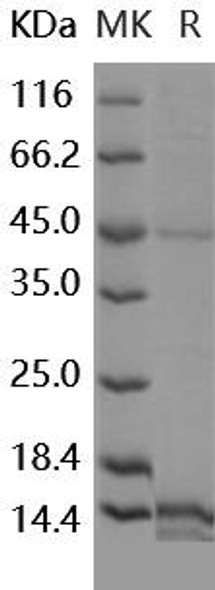Description
| Product Name: | Mouse EG VEGF Recombinant Protein |
| Product Code: | RPPB0162 |
| Size: | 20µg |
| Species: | Mouse |
| Target: | EG VEGF |
| Synonyms: | PK1, Prokineticin 1, EG-VEGF, Prok1, Endocrine-gland-derived vascular endothelial growth factor. |
| Source: | Escherichia Coli |
| Physical Appearance: | Sterile Filtered White lyophilized (freeze-dried) powder. |
| Formulation: | Lyophilized from a 0.2�m filtered concentrated solution in PBS pH7.4 and 3% Trehalose. |
| Solubility: | It is recommended to reconstitute the lyophilized Endocrine Gland Vascular Endothelial Growth Factor in sterile 18M?-cm H2O not less than 100�g/ml, which can then be further diluted to other aqueous solutions. |
| Stability: | Lyophilized EG-VEGF Human Recombinant although stable at room temperature for 3 weeks, should be stored desiccated below -18°C. Upon reconstitution EG-VEGF should be stored at 4°C between 2-7 days and for future use below -18°C.Please prevent freeze-thaw cycles. |
| Purity: | Greater than 95.0% as determined by:(a) Analysis by RP-HPLC.(b) Analysis by SDS-PAGE. |
| Amino Acid Sequence: | AVITGACERD IQCGAGTCCA ISLWLRGLRL CTPLGREGEE CHPGSHKIPF LRKRQHHTCP CSPSLLCSRF PDGRYRCFRD LKNANF |
Endocrine gland-derived vascular endothelial growth factor (EG-VEGF) induces proliferation, migration, and fenestration in capillary endothelial cells derived from endocrine glands. Its expression is induced by hypoxia and is restricted to the steroidogenic glands (ovary, testis, adrenal, and placenta). Its expression is often complementary to the expression of VEGF (MIM 192240), suggesting that these molecules function in a coordinated manner. EG-VEGF potently contracts gastrointestinal (gi) smooth muscle. Induces proliferation, migration and fenestration (the formation of membrane discontinuities) in capillary endothelial cells derived from endocrine glands. Has little or no effect on a variety of other endothelial and non-endothelial cell types.
EG-VEGF Mouse Recombinant produced in E.Coli is a single, non-glycosylated, polypeptide chain containing 86 amino acids and having a molecular mass of 9.6kDa.
| UniProt Protein Function: | Potently contracts gastrointestinal (GI) smooth muscle. Induces proliferation, migration and fenestration (the formation of membrane discontinuities) in capillary endothelial cells. Induces proliferation and differentiation, but not migration, of enteric neural crest cells. Directly influences neuroblastoma progression by promoting the proliferation and migration of neuroblastoma cells. Positively regulates PTGS2 expression and prostaglandin synthesis. May play a role in placentation. May play a role in normal and pathological testis angiogenesis. |
| UniProt Code: | Q14A28 |
| NCBI GenInfo Identifier: | 117676357 |
| NCBI Gene ID: | 246691 |
| NCBI Accession: | NP_001037847.1 |
| UniProt Secondary Accession: | Q14A28,Q0P609, Q8K457, |
| UniProt Related Accession: | Q14A28 |
| Molecular Weight: | 10,078 Da |
| NCBI Full Name: | prokineticin-1 isoform 1 |
| NCBI Synonym Full Names: | prokineticin 1 |
| NCBI Official Symbol: | Prok1�� |
| NCBI Official Synonym Symbols: | EG-VEGF�� |
| NCBI Protein Information: | prokineticin-1 |
| UniProt Protein Name: | Prokineticin-1 |
| UniProt Synonym Protein Names: | Endocrine-gland-derived vascular endothelial growth factor |
| Protein Family: | Prokineticin |
| UniProt Gene Name: | Prok1�� |










